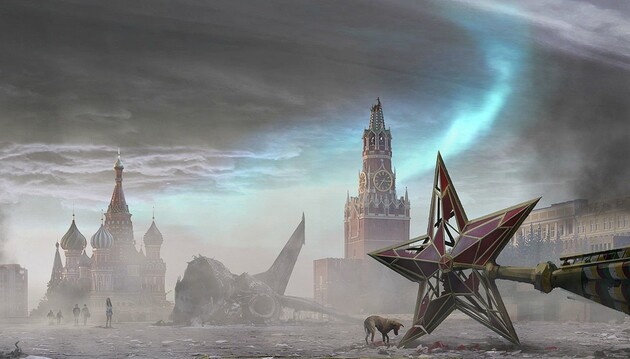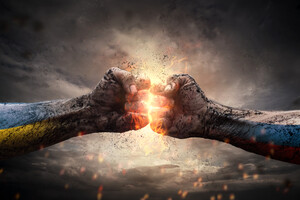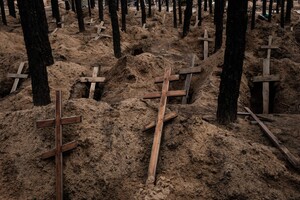Black mark: what is happening in Putin's entourage

The International Criminal Court, having issued a warrant for the arrest of the Russian president, handed Vladimir Putin a black mark. At the same time, it sent a red signal to the representatives of the Russian elite - it will not get away with it: cooperation with the abductor of Ukrainian children means complicity in this and his other crimes, and Russia will not be able to achieve the lifting of international sanctions and return to the community of civilized states without implementing the decision of the International Criminal Court.
So, Putin must go. Alone or with a little help from his entourage.
But do people in the Kremlin feel the threat of a palace coup? Does Putin look around when he walks through the corridors of the Kremlin Senate Palace, Kabaeva's Valdai "terem" or one of his many bunkers?
Judging by the gloomy faces of the participants of the congress of the Russian Union of Industrialists and Entrepreneurs (RSPP), at which Putin spoke, many representatives of big Russian business have no desire to pay and suffer for the imperial ideas of a man who is a Kremlin admirer of Ivan Alexandrovich Ilyin. In addition, the experts we consulted believe that if something threatens the Putin regime today, it is not the protest mood of Russians, insignificant and inconspicuous economic collapse and interregional conflicts, but the split between the elites.
Unfortunately, the Russian elite is not yet ready to organize Die Walkyrie operation and hand over "Mikhail Ivanovich" for disposal: the ruling group remains monolithic.
At the same time, dissatisfaction with Putin himself, who began to make many mistakes in strategic decisions, is growing in the Russian establishment. For example, underestimation of the resistance of Ukraine and the rigidity of the West. Moreover, saying that "we will go to heaven as martyrs and they will just die" does not really inspire people who dream of ending their days in a villa on the Cote d'Azur, playing a little in the casino or enjoying the Mediterranean sun on their own yacht surrounded by beautiful girls. Despite Putin's fading eagle, the establishment is still far from an open rebellion and is not ready to declare the "tsar" to be false. In addition, if a part of the elite does not share the goals of the "special military operation" announced by the "chief", the conclusions of his pseudo-historical intelligence and anti-Western tendencies in the country leadership, then they do not speak about it publicly: no one wants to sacrifice what they have earned through hard work. On the contrary, many people demonstrate feelings of loyalty, in particular, by participating in the flash mob ##МУСПутинЭтоЯ.
As Alexandra Prokopenko, an invited employee of the German Council on Foreign Relations (DGAP), believes, "the lack of a clear mechanism for getting out of sanctions or at least a dialogue on this topic is forcing the Russian elite to strengthen their position inside the country." This is only one of the reasons why the establishment remains loyal to the regime. Other reasons include pseudo-patriotism, fear of reprisals. In this situation, both officials and businessmen (especially big ones) are thinking about how to get out of this uncomfortable situation. It is worth noting that each of them has his own survival strategy.
At the same time, the Kremlin wants to "smear" the entire establishment with blood as much as possible.
Yes, big business is pushed to pay "voluntary" contributions to the Russian budget. Heads of regions form volunteer battalions. In addition, the reputations of the head of the Central Bank of Russian Federation, Elvira Nabiullina, the Minister of Finance, Anton Siluanov, and the head of Sberbank, Herman Gref, are hopelessly ruined, because they became accomplices to aggression, starting to restructure the Russian economy to meet the demands of wartime and to ease sanctions: in fact, they saved the regime.
Despite the fierce intra-elite confrontation, influential groups remained loyal to the "tsar". There is no visible split in Putin's inner circle either. During the year that has passed since the large-scale invasion, not a single "Kremlin tower" has been destroyed and no one has been thrown out of the game: Putin has decided not to upset the balance of the political system. Nevertheless, changes have taken place in it.
Thus, Yury Kovalchuk's group, which strongly promoted the idea of invading Ukraine, strengthened. The shareholder of the Rossiya Bank is most interested in Putin staying in power, because all the influence of the supporter of conspiracy theories in the Russian political system rests on his personal closeness to the "boss". It is not surprising that he will support Putin to the end. After all, as soon as the current president of the Russian Federation leaves, the capitalization of the Kovalchuk brothers will also collapse.
Thanks to frequent communication with Putin, the influence of the Deputy Head of the Presidential Executive Office of Russia Sergey Kiriyenko, who oversees the occupied Ukrainian lands and controls the entire process of formation of Russia's modern "elite", has grown over the year: now he is an independent figure. Therefore, Kovalchuk's group transformed into the Kovalchuk-Kiriyenko group, which includes the chairman of the government of the Russian Federation Mikhail Mishustin, the Secretary of the General Council of United Russia Andriy Turchak, the owner of "Wagner" PMC Yevgeny Prigozhin and others.
The Kovalchuk-Kiriyenko group actively interacts with such heavyweights as the Secretary of the Security Council of the Russian Federation Nikolai Patrushev and the head of the Rosneft Oil Company Igor Sechin. However, the influence of this "triumvirate" does not at all mean that its representative will become Putin's successor when he leaves power: none of the "Kremlin towers" have the resources to take power into their own hands.
At the same time, processes are taking place inside the system that are slowly destroying the regime. In particular, the loss of the state's monopoly on the power resource. However, as evidenced by the story of the owner of PMK "Wagner" Evgeny Prigozhin, the Kremlin managed to take control of these new operators of the power resource. In addition, the Russian generals, despite public accusations of humiliating defeats on the fronts of the Russian-Ukrainian war, remain loyal to the authorities.
It is important to remember: for those who currently have a power resource, after Putin's departure, the opportunities will only increase. And for people like Kovalchuk, the political "Dow-Jones index" will go down sharply.
In each case, the influence groups will have to negotiate among themselves, trying to find a compromise candidate. This was the case after Stalin's death in the spring of 1953, and after the removal of Khrushchev in the fall of 1964. At the same time, it is not at all a fact that Putin's successor will be less aggressive in politics towards Ukraine and the West, or that a person who will be seen as compromising will be satisfied with his temporary status: both Khrushchev and Brezhnev managed to strengthen their positions and do away with rivals.
Judging by all indications, in the Kremlin, since they believe that any changes in the configuration of power threaten it with collapse, they have abandoned the idea of a transfer of power and are preparing for Putin's participation in the 2024 presidential elections. Although polls in Russia have long been unreliable, there is every reason to believe that the Russian president retains the support of the vast majority of the population. Citizens do not show dissatisfaction with the war in Ukraine: a year after the large-scale invasion, there was a colossal exodus of the population disloyal to the Kremlin from large Russian cities.
Putin openly states that Russians should prepare for a protracted war, proposing to live in a world where military actions will become the norm for years to come. In addition, while earlier politicians and sociologists were faced with the question of who would win - a refrigerator or a TV set, now it sounds like this: "A MORTUARY REFRIGERATOR or A TV SET?". However, taking everything into account, the Kremlin does not expect that due to problems in the economy and the increase in the number of zinc coffins, the main mass of the population, which leads a rather ascetic lifestyle, will start a Russian rebellion in the near future, and this time it will be meaningful, not just merciless. After all, the authorities took into account the mistakes made during the first stage of mobilization, and now military recruiting is carried out mainly in depressed regions.
However, many processes in Russia will be influenced by how events will develop at the front in the spring. An explosion can happen at any time and for any reason. It is important for us that after the end of the Russian-Ukrainian war, Russia ceases to threaten the security of Ukraine. In order for this to happen, it must cease to be an empire. Perhaps the dismantling of Russia will take decades: it has a safety margin, including an economic one. However, the bloody disintegration of this state has much more real prospects than its democratization.
Read this article in russian and Ukrainian.
Please select it with the mouse and press Ctrl+Enter or Submit a bug














 Login with Google
Login with Google